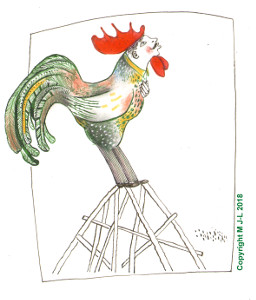If crowing white man is top of the heap, who is at the bottom? Disabled babies perhaps
 We live with pecking orders. We ascribe value to each other. We jostle for position.
We live with pecking orders. We ascribe value to each other. We jostle for position.
Perhaps the jostling is easiest for white people and amongst those, easiest for men. Isn’t this the repeated lesson of history?
Intellectual, physical or sensory disability must make the jostling harder even though in these populations there is bravery, determination, political awareness and compassion.
But what about babies who have disabilities? Here are my reasons for suggesting these children are at the bottom of the heap and last in the pecking order – how outdated support systems give them lives of misery instead of quality. I write primarily from experience in my country.
There are no standards for early childhood intervention. Some postcodes are better than others. Some hospitals are better than others. Some community services are better than others.
While we know attachment is crucial for those developing typically, we ignore it in our work with disabled babies.
Each baby can have a host of strangers dealing with them, often in very hostile environments.
We know babies need quiet stress-free times but our disorganised and fragmented interventions keep parents and children busy, exhausted and stressed.
We give little thought to the psychological wellbeing and mental health of babies with disabilities - or of their parents.
Though help with learning is a major need, we often persist with a medical model long after educational support would be more appropriate.
Instead of keeping families strong, we allow families with disabled babies to struggle against the odds and perhaps fall apart.
Instead of supporting parents in their upbringing role, we can undermine them in the face of our expertise.
Devaluing other people and wanting to put them below us in the pecking order comes from extreme arrogance and has serious consequences.
Catherine Nicholson of France 24 television in speaking about being harassed by men says, “It’s a question of respect. At some level they just don’t see us as human in the way they are human.” (Guardian, 4/8/18)
Is there a prevailing attitude that babies with disabilities are not fully human, not ‘proper’ children? That they are more deserving of harsh early childhood intervention than celebration as new lives?
Peter Limbrick, August 2018

Peter is author of ‘Early Childhood Intervention without Tears: Improved support for infants with disabilities and their families.’
Available here and on Amazon.
Your comments welcome.
Cartoon from TAC Bulletin 226

